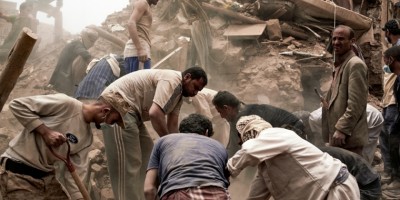Invasion of Yemen in Blatant Derogation of International Law: Extensive War Crimes Committed

One year before overthrowing Ali Abdullah Saleh in 2012, the Security Council of the UN, anxious about the events happening in Yemen, issued a resolution according to which all belligerent sides should immediately reject violence and called on them to commit a peaceful transition of power.
On 21 February 2012, in contradiction to the resolution and the article 108 of the constitution of Yemen, Abd Rabbuh Mansur Hadi, then vice president, held a presidential election in which he was the sole candidate, and as a result of which he became president for two years. When Shia insurgency intensified against Hadi, he abdicated in January 2015 and fled to Saudi Arabia requesting help from that country.
On 26 March a coalition of some Arab countries, as well as Pakistan, under the command of Saudi Arabia invaded Yemen calling their operation “al-Hazm Storm”. The Arab countries of Morocco, Sudan, Egypt, Qatar, Bahrain, Kuwait, and UAE have taken part in the operation, and Somalia allowed the coalition to use its military bases to invade Yemen.
The coalition claims that the reason of its attack to Yemen was the letter which has been written by Hadi, after his abdication, requesting the UN and Saudi Arabia to intervene in Yemen by land force. On the other hand, the coalition forces, in their letter to the UN, claimed that the Houthis seek for hegemony on Yemen, using this country as a base to affect the region. Therefore, they claimed, the threat of Houthis is not only against the security, stability, and sovereignty of Yemen, but also against the peace and security of the region as well as international community. Pondering on the letter, it could be inferred that the coalition is not worried about the people of Yemen, but they are deeply scared of the impact of some other countries on Yemen. In fact, Saudi Arabia is deeply anxious about Yemen to be out of Saudi’s control, which was continuous for consecutive decades.
The invasion of Yemen entailed different reactions amongst different countries. Although the US, Canada, France, the UK, Israel, and Turkey, are amongst the supporters of the invasion, Russia, Iran, Iraq and Syria were against the attack. China and the UN also declared their anxiousness about the invasion.
Prohibition of the use of force is one of the basic principles on which international law has been founded. According to Article 2(4) of the Charter of the UN, all members shall refrain in their international relations from the threat or use of force against the territorial integrity or political independence of any state.
According to The Declaration on Principles of International Law concerning Friendly Relations and Co-operation among States adopted by the General Assembly on 24 October 1970 (resolution 2625 (XXV)), “A war of aggression constitutes a crime against the peace, for which there is responsibility under international law.”
According to the declaration, “States have the duty to refrain from propaganda for wars of aggression … [and] every State has the duty to refrain from the threat or use of force to violate the existing international boundaries of another State.” Although the declaration is not legally bounding, it is an important reliable document for the interpretation of the relevant rules of the UN charter. Therefore, the use of force for furthering national policy as well as interference in internal affairs of other countries, create the infringement of basic principles of international law.
The prohibition of the use of force has some exceptions, including self-defence and collective security system, which are not enforceable on the case of Yemen. No armed attack had been occurred by Yemen against the members of the coalition. Although the security council in its resolutions number 2201 and 2216 has considered Hadi as president of Yemen and referred to his letter in which he had requested help from the Arab League, the reliability of the resolutions, because of their being against ius cogens, ought to be regarded with suspicion. Many defenceless civilian Yemeni people were killed by the recurrent air strikes of the coalition which attacked them indiscriminately.
Although it has been claimed that the invasion has taken place based on the letter of Yemeni’s president, in should be said that Hadi was not the president of Yemen at the time of the letter. He, and his cabinet, had abdicated before as a result of a popular uprising, not as a result of a coup or something like that, as in Haiti in 1991. Therefore, he was not the representative of Yemeni people to request international community to intervene in Yemen.
To sum up, considering the rules of international law, it seems that the military operation of the coalition against Yemen is in contrast to international law; because of the fact that it was not an occupation by another state, such as Kuwait in 1990, and it was not a military coup, in contrast to the claims of Hadi, in Yemen. The Yemeni people would like to overthrow Hadi; but he supressed them with ultimate cruelty; for example, in the bloody Friday of 8 March 2011, more than 50 people were killed and 240 were wounded. Instead of listening to the demands of the downtrodden people of Yemen, the government of Hadi tried to suppress them violently; and it was condemned several times by international organisations, such as amnesty international and the UN. Now the breach of the sovereignty of Yemen and its territorial integrity is against the goals and purposes of the UN Charter. Being against humanitarian international law, it not does not help to create peace and security in the region; but it helps the terrorist groups such as Al-Qaeda to grow up.
Amir Abbas Amirshekari, PhD in International Law (University of Tehran, Iran), Advocate (Iran Bar Association)

